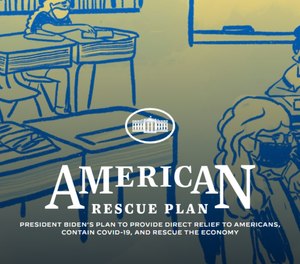
Cities and counties will receive $130 billion in aid for COVID-19 response
The big headlines from the recent passage of the American Rescue Plan (ARP) were around the $1,400 stimulus payments to individuals and the expanded child tax credit. These payments and additional benefits for individuals and families are indeed historic. But for public safety and government leaders, there’s an equally important factor to understand—the impact of the American Rescue Plan on local government.
While designed to help individuals, the ARP is also aimed at providing relief for local and state governments and businesses struggling due to COVID-19, as well as to achieve other priorities of the Biden Administration and Congress. The $1.9 trillion legislation is in addition to nearly $4 trillion in COVID relief provided in 2020.
The American Rescue Plan provides for aid to both state and local governments directly as well as several grant program opportunities to improve local community’s response and recovery to COVID-19. The latest COVID relief legislation was enacted as part of Congress' fiscal year (FY) 2021 budget.
These funds for state governments, metropolitan cities, municipalities and counties may be used to cover costs incurred to:
Amounts provided to a locality cannot exceed 75% of the local government’s budget as of Jan. 27, 2020. In addition, two restrictions on the use of funds are outlined in the language:
As with most grant programs, the American Rescue Plan requires all states, territories, tribal governments, metropolitan cities, municipalities and counties receiving payments to submit periodic reports with a detailed accounting of the use of funds.
Of the approximately $350 billion for fiscal relief, 57% is allocated to states and 35% to local governments. Specifically, the legislation allots $195.3 billion to states and the District of Columbia, breaking down as follows:
The impact of the American Rescue Plan on local government will also be substantial, as it provides $130.2 billion to local governments, including:
The ARP also provides $4.5 billion to U.S. territories, $20 billion to tribal governments, and $10 billion for a Coronavirus Capital Projects Fund to carry out projects to support work, education and health monitoring during COVID-19.
To get a sense of how the American Rescue Plan will impact your community, download a breakdown of estimated allocations to state and local governments.
Funds administered through the American Rescue Plan will be distributed by the U.S. Department of the Treasury, and all funds must be spent by Dec. 31, 2024.
Payments will be released in two tranches, or portions—the first within 60 days of enactment of the legislation, and the second no earlier than 12 months after the first payment. To receive a payment either under the first or second tranche, local governments must provide the U.S. Treasury with a certification signed by an authorized officer.
Public safety organizations need to be working with their local governments now to advocate needs and access the direct funds to their cities and counties. In addition to the $350 billion allocated directly to local government, the American Rescue Plan also provides additional funding for several grant programs well known to public safety agencies, making it even more important your agency is tapping these programs if possible. They include:
Lexipol’s grants experts continue to monitor these programs and the impact of the American Rescue Plan on local government. As we learn more, we’ll share further guidance and access instructions.
Copyright © 2025 GovGrantsHelp.com. All rights reserved.
